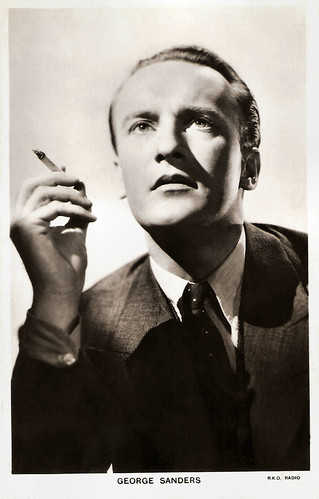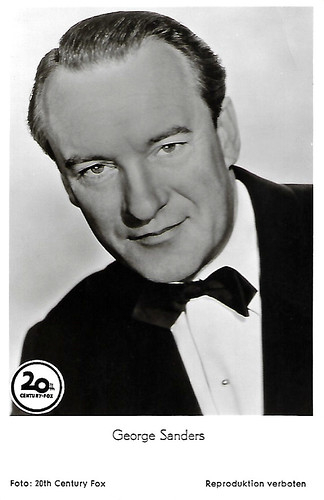
British postcard in the Picturegoer Series, London, no. W 78. Photo: United Artists.

Vintage card, no. 1. Photo: Warner Brothers.
Memorable villains
George Sanders was born in 1906 in Saint Petersburg, Russian Empire. He was the second of three children. His parents, Henry and Margaret Sanders were British. In 1917, when the Russian Revolution broke out, George was eleven years old and the family returned to England.
After his education at Bedales School in Hampshire, Sanders began studying at Brighton College and later at Manchester Technical College. The studies prepared him to follow his father into the textile business. As a businessman, he worked first in textiles and later in tobacco. After a brief sojourn in South America, he returned to the UK.
In the early 1930s, he worked in an advertising agency, where Greer Garson, an aspiring secretary and actress, suggested he become an actor. He took on a small role in the revue 'Ballyhoo'. From chorus boy, he moved to cabaret, radio and theatrical understudy. He made his film debut in Find the Lady (Roland Grillette, 1936). He played one of the leading roles in his second feature film, Strange Cargo (Lawrence Huntington, 1936).
George Sanders tried his luck in Hollywood. He made his first American film Lloyds of London (Henry King, 1936) for 20th Century Fox. The stars were Tyrone Power and Madeleine Carroll. He quickly made a name for himself in adventure hero roles. He was able to increase his popularity with memorable portrayals of villains such as in The House of the Seven Gables (Joe May, 1940).
His elegant figure, deep voice, discreet yet mocking smile and perfect diction - at least by the standards of the time for a well-bred Briton, i.e. in no way identifiable with a region, but reflecting his membership of the upper social classes - naturally led George Sanders to roles as a seducer, often unscrupulous and rather snobbish and cynical.

British postcard in the Picturegoer Series, London, no. 1241a. Photo: R.K.O. Radio.

British postcard in the Picturegoer Series, London, no. W 540. Photo: United Artists.
The Saint and the Falcon
Alfred Hitchcock cast George Sanders in his first Hollywood films, Rebecca (1940) and The Foreign Correspondent (1940). Sanders starred in Rebecca as Jack Favell, Laurence Olivier's devious adversary. In Foreign Correspondent, he had an infinitely more sympathetic role as a clever secret agent.
His physical appearance predestined him not only for portrayals of aristocrats such as in Forever Amber (Otto Preminger, John M. Stahl, 1947) but also for roles in the popular crime film series of the time. Thus, from The Saint Strikes Back (John Farrow, 1939) onwards, he played Simon Templar (The Saint) in a film series, and with The Gay Falcon (Irving Reis, 1941), a similar series around The Falcon was started.
During the Second World War, George also appeared in propaganda films, such as Confessions of a Nazi Spy (Anatole Litvak, 1939) and Man Hunt (Fritz Lang, 1941). Increasingly committed to one type of role, George Sanders said goodbye to the Falcon, leaving it to his brother Thomas Charles Sanders, who also worked as an actor under the pseudonym Tom Conway. Tom succeeded him as The Falcon in The Falcon's Brother (Stanley Logan, 1942).
After the war, Sanders devoted himself more to character roles. Albert Lewin gave him his most significant roles: that of Lord Henry Wotton, a friend of Dorian Gray's painter (Hurd Hatfield) in The Portrait of Dorian Gray (Albert Lewin, 1945), an American fantasy drama based on Oscar Wilde's novel, and then that of the cynical Bel-Ami in The Private Affairs of Bel Ami (Albert Lewin, 1947) after Guy de Maupassant. He particularly often played eloquent and sophisticated, yet seemingly shady characters from the British upper class - for example as the secretly married suitor of Gene Tierney in The Ghost and Mrs. Muir (Joseph L. Mankiewicz, 1947).
Sanders won the Academy Award for Best Supporting Actor for portraying the sophisticated and sarcastic theatre critic Addison DeWitt in the satirical film All About Eve (Joseph L. Mankiewicz, 1950) starring Bette Davis. In England, Sanders starred alongside Robert Taylor in the literary adaptation Ivanhoe (Richard Thorpe, 1953). In 1954 he travelled to Naples where he played the male lead alongside Ingrid Bergman under Roberto Rossellini's direction in the marriage drama Viaggio in Italia/Journey in Italy (1954). Back in the United States, he played an aristocratic villain in the adventure film Moonfleet (Fritz Lang, 1955).

West German postcard by Film-Postkartenverlag, Hambrug-Bergedorf, no. 161. Photo: 20th Century Fox.

Italian postcard by Rotalfoto, Milano, no. 461.
A fatal cocktail of Nembutal and vodka
After 1955, George Sanders began to appear regularly in television series including The George Sanders Mystery Theater (1957), The Man from U.N.C.L.E. (1965) and Batman (1966) as Mr. Freeze. In the classic Science Fiction horror film The Village of the Damned (Wolf Rilla, 1960), the actor took on the role of retired physicist Gordon Zellaby opposite Barbara Shelley.
Sanders also provided the voice of Shere Khan the tiger in the original version of the Disney animated classic The Jungle Book (Wolfgang Reitherman, 1967). In the British horror film Psychomania (Don Sharp, 1973), starring Nicky Henson, Sanders played his last film role, a servant.
George Sanders committed suicide in 1972 in Catalonia in his hotel room in Castelldefels, south of Barcelona, by drinking a cocktail of Nembutal and vodka to ease the pain of a long illness. He was 65 and was married four times.
Sanders married Susan Larson in 1940. The marriage lasted until 1949. He then married Hungarian actress Zsa Zsa Gabor in 1949. The marriage lasted until 1957. His third wife became the actress Benita Hume in 1959, to whom he was married until her death in 1967. His 1970 marriage to Zsa Zsa Gabor's older sister Magda lasted only six weeks.
It was at this time that Sanders began to indulge in alcohol. He wrote an autobiography, 'Memoirs of a Professional Cad' (1960), in which he commented very ironically on the course of his life, and also summed up his marriage to Zsa Zsa Gabor.

American Arcade card.

French postcard by Editions G. Picard, Paris, no. WD 8/42. Image: Walt Disney Productions. Shere Khan and Mowgli in The Jungle Book (Wolfgang Reitherman, 1967).
Sources: Wikipedia (English, German and Dutch) and IMDb.
No comments:
Post a Comment